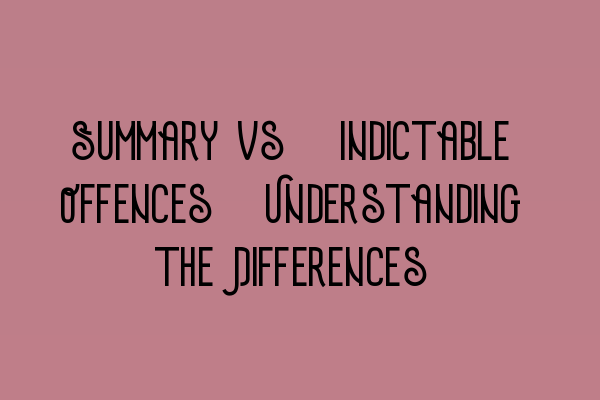Summary vs. Indictable Offences: Understanding the Differences
When it comes to criminal law in the UK, offences can be classified as either summary or indictable. Understanding the differences between these two categories is crucial for both legal professionals and individuals involved in legal matters. In this article, we will delve into the distinctions between summary and indictable offences, providing you with a clear understanding of their characteristics and consequences.
Summary Offences: Quick and Efficient Justice
Summary offences, also known as minor offences, are generally less serious criminal infractions that are tried in a magistrates’ court. These offences are typically straightforward and can be resolved quickly, ensuring a swift administration of justice in less severe cases.
Examples of summary offences include petty theft, minor public order offences, common assault, and traffic violations such as speeding or driving without insurance. While these offences may not carry severe penalties, it is essential to address them promptly to prevent any potential consequences on your criminal record and future prospects.
If you find yourself facing a summary offence charge, it is advisable to seek legal advice from qualified solicitors who specialize in handling such cases. They can guide you through the legal process, protect your rights, and help you achieve the best possible outcome.
Indictable Offences: Serious Crimes Demanding Due Process
Indictable offences, on the other hand, are more serious crimes that typically carry harsher penalties. These offences may range from theft and burglary to assault causing grievous bodily harm, drug trafficking, and even murder. Due to their gravity, indictable offences are tried in higher courts, such as the Crown Court, where the penalties can be more severe.
The procedures involved in indictable offences are more complex and require a higher level of legal expertise. The accused is entitled to a trial by jury, and the case proceedings are more intricate, involving legal arguments, evidence examination, and cross-examinations. Moreover, the potential penalties for indictable offences can include lengthy prison sentences, substantial fines, and additional consequences like asset forfeiture or community service orders.
If you are facing an indictable offence charge, it is crucial to engage the services of experienced criminal solicitors who possess the necessary skills and knowledge to handle such complex cases. They will advocate for your rights, build a strong defense strategy, and aim to secure the best possible outcome in court.
The Distinction: Summary vs. Indictable
The distinction between summary and indictable offences lies primarily in their associated penalties and seriousness. Summary offences are generally less severe, attracting minor penalties such as fines, community service, or short jail sentences. On the other hand, indictable offences are considered more serious, carrying the potential for longer prison terms and more substantial fines.
The decision on whether a case is tried as a summary or an indictable offence depends on various factors, including the nature of the crime, its severity, and the potential impact on the victim and society. Legislation sets out specific guidelines for categorizing offences as summary or indictable, ensuring a fair and just legal framework.
To fully grasp the complexities of these legal distinctions and their implications, it is advisable to familiarize oneself with the UK’s criminal law system through comprehensive SQE 1 and SQE 2 preparation courses. These courses provide aspiring legal professionals with in-depth knowledge and essential skills required to succeed in the Solicitors Qualifying Examination (SQE) and pursue a rewarding career in criminal law.
If you are preparing for the SQE exams, it is crucial to practice regularly to enhance your knowledge and test-taking skills. You can benefit from SQE 1 Practice Exam Questions and SQE 1 Practice Mocks FLK1 FLK2 to ensure you are adequately prepared for the assessments.
Next Steps
Understanding the differences between summary and indictable offences is crucial in navigating the complexities of criminal law in the UK. Whether you are preparing for the SQE exams or dealing with legal matters personally, ensuring you have the necessary knowledge and guidance is vital.
When faced with a summary or indictable offence charge, it is crucial to seek legal advice from qualified criminal solicitors who specialize in the relevant area of law. They can provide you with the expertise and support needed to protect your rights, build a robust defense, and achieve the best possible outcome in court.
For more information on SQE preparation courses and exam dates, visit our related articles:
- SQE 1 Practice Exam Questions
- SQE 1 Practice Mocks FLK1 FLK2
- SQE 2 Preparation Courses
- SQE 1 Preparation Courses
- SRA SQE Exam Dates
